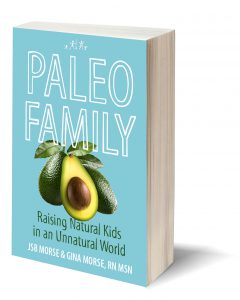The Purpose of a Diet

Modified from the original article by JSB Morse, author of Zero to Paleo.
Ever since certain fad diets became popular in the seventies and eighties, the general conception of a ‘diet’ is viewed as a quick and easy tool to help its participants lose a few pounds, without any regard to lifelong eating habits. In other words, it is seen as a short-term fix. What ends up happening with people on these diets geared to the short term is that they tend to go back to eating poorly after the weight goal has been met or worse, hasn’t been met and seems impossible to achieve. In fact, researchers at UCLA have recently revealed shocking findings: dieting just doesn’t work. The school reviewed 31 long-term studies on dieting and found that people who go on diets usually end up regaining all of the weight they lost, plus some. In addition to the weight gain, researchers say that the ups and downs of dieting cause added stress and contribute to heart disease. The study seems bleak for those looking to shed pounds, but, still, people continue to try quick-fix diets multiple times, usually to no avail.
This type of yo-yo dieting is confusing to the body and frustrating for one’s mental state, however appealing it may seem with the shocking claims these short-term diet pushers make. Testimonials similar to, “I lost 50 pounds in 5 weeks!” to, “I dropped 15 pounds the first week!” lead to inaccurate interpretations of what a diet should be. If these people were to continue on their so-called diet, they would be weightless within a couple years. Now that would be amazing!
 The truth is these diets, which cut out so much weight instantly, are most likely just dehydrating the body. The weight lost on these diets is in H 2 O not LBS, and since the body is about 60% water, it is fairly easy to a few pounds of it. Inevitably, though, the ‘contestants’ on these ‘miracle diets’ must change their habits back or at least alter them so as not to eliminate themselves from existence altogether.
The truth is these diets, which cut out so much weight instantly, are most likely just dehydrating the body. The weight lost on these diets is in H 2 O not LBS, and since the body is about 60% water, it is fairly easy to a few pounds of it. Inevitably, though, the ‘contestants’ on these ‘miracle diets’ must change their habits back or at least alter them so as not to eliminate themselves from existence altogether.
But these whacky eating habits are missing the point completely and they are leading to a misnomer: a diet, by definition, is not some two-week panacea to help you lose weight. A diet is someone’s general intake of food. People still have a diet even when they’re not on a diet. A diet also is something that takes place over one’s entire life, not just the five weeks before one’s wedding day or class reunion. When looked at in this light, people who go on those gimmicky diets advertised on late-night television aren’t on a high-protein diet, or a lettuce-only plan; these people are on an extremely unhealthy yo-yo diet.
Changing one’s eating habits so drastically so often is bad for one’s health, something that most diet promoters fail to explain. Interestingly, an obese person has a better chance of living longer than someone who fluctuates habitually between being obese and having an ideal weight. A University of Michigan study conducted by cardiologist Cardiologist Claire Duvernoy, M.D. has found that a direct link to the gain-loss-gain syndrome of yo-yo dieting and cardiovascular disease in women. It turns out that such an oscillation of weight adds a great deal more stress than a constant weight. But Natural Man went through long droughts without food–doesn’t that mean that we are designed to withstand ups and downs in our diet like our ancestors? While we do have a remarkable capability to adapt to our environment (described further in Part Two), up-and-down dieting is still considerably harmful. In addition, during a drought, Natural Man’s body mass index (BMI) shifted from ideal to underweight and back–a completely different physiological story than a BMI that shifts from obese to overweight and back.
That isn’t to say that one shouldn’t try to lose weight if they’re a little tight in the waistline. The constantly obese person has a drastically smaller chance of living longer than someone at a constant ideal weight. A Dutch study published in the Annals of Internal Medicine (2003) says that obese women live an average of 7.1 fewer years than women of normal weight. Obese men live 5.8 fewer years on average than their healthy counterparts. That’s almost 10% of an average life!
The solution for everyone would be a method of eating that would bring everyone to their ideal weight and keep them there without going back and forth with different so-called diets. The common opposition to that statement would be, “Well, everyone is different. There can’t possibly be a diet that works for everyone.” It just so happens that at one point, all humans did eat the same diet: the natural hunter/gatherer diet, and they were remarkably healthier than we are today despite lack of medicine and wealth as we’ll see later.
That is one of the great aspects of The Evolution Diet: it supports a healthy lifestyle for everyone, regardless of personality or physical makeup. Because this method of eating is strictly linked to the natural methods of the body, it will work to create a stable, healthy weight for everyone who adheres to the guidelines. One of the most vital concepts of the Evolution Diet is that it is even beneficial for people with ideal weights, thus someone can maintain just one diet for their entire life, the healthy way it should be.
What about the fat gene? Some people would argue that some people were born with a ‘fat gene,’ and it is nearly impossible for those people to maintain a healthy weight without surgery or medical assistance in the form of prescription drugs. It is understandable if you have accepted this train of thought since it pervades the popular media. There are people out there that want to make you think that you have no say in your physical state. . . ah, but their magical pill does. That seems a little suspect to me.
It just so happens that there is very little, with respect to genes, that differs between humans, even when it comes to weight maintenance. A recent study conducted by Dr. Roy J. Britten at the California institute of Technology (published in Proceedings of the National Academy of Sciences ) has found that even humans and chimpanzees have nearly identical genetic makeup. According to the study, 95% of the genetic makeup of chimps is the same as that of humans. Shockingly, we’re even quite similar to plants like a pumpkin. Similar methods of experimentation showed that pumpkins and humans share about 75% of our DNA. However, this doesn’t mean we need to look like a pumpkin!
Based on these findings it appears that just being alive accounts for so much of our genetic code, that there is very little left over to produce differences like eating tendencies. The CIT study has found that two different humans are 99.9% genetically identical. Based on the number of genes scientists have found that humans have (about 30,000), you are only 30 or so genes different from Mick Jagger (this applies to everyone with the normal amount of 23 paired chromosomes). That’s astounding.
It turns out that our previous idea of a gene for every protein created was the wrong way to think about it. It’s not the number of genes that determines who we are, but what our genes do with what they are given that gives us the diversity and complexity of being human. So we can actually alter what our genes do and how they work based on what we feed them. In other words we actually are what we eat.
Likewise, the perception that people have that their genetic makeup is what determines who they are is also false. It is what we DO with our genetic makeup that makes us who we are.
 This stirs up the ancient argument of Nature versus Nurture, which to my knowledge has not been definitively answered. No one can deny we are products of our genes–just think of all the times you’ve heard, “You’ve got your father’s eyes,” or more unfortunately, “You’ve got your father’s bald patch.” But even the most ardent Naturalists will concede that behavior plays a significant role in one’s physical construction. They would add that all people could be fit and healthy, though they would argue that some people need to try harder than others for ideal health. I contest that it’s not a matter of trying harder, but rather being more thoughtful and simply living how we were designed to live. Thus, without going in to the argument of Nature versus Nurture, we must stipulate that regardless of one’s genetic makeup, everyone can be lean and fit. No one is precluded from attaining a healthy body and a healthy mind (with an ideal weight).
This stirs up the ancient argument of Nature versus Nurture, which to my knowledge has not been definitively answered. No one can deny we are products of our genes–just think of all the times you’ve heard, “You’ve got your father’s eyes,” or more unfortunately, “You’ve got your father’s bald patch.” But even the most ardent Naturalists will concede that behavior plays a significant role in one’s physical construction. They would add that all people could be fit and healthy, though they would argue that some people need to try harder than others for ideal health. I contest that it’s not a matter of trying harder, but rather being more thoughtful and simply living how we were designed to live. Thus, without going in to the argument of Nature versus Nurture, we must stipulate that regardless of one’s genetic makeup, everyone can be lean and fit. No one is precluded from attaining a healthy body and a healthy mind (with an ideal weight).
This is one of the most important factors in achieving a healthy lifestyle: You must know that you can do it for it to be possible at all. The beneficial aspects of positive psychology are unlimited, and though the idea is important to understand, it deserves its own book and I can’t do it justice here. Instead, here’s a list of clichés that illustrate the benefits of positive thinking:
- “You can’t achieve anything without trying.”
- “A negative attitude will get you nowhere.”
- “The luckiest people tend to be the one who always work harder.”
- “Nothing valuable comes without a price.”
- “Haste makes waste.”
- “When life gives you lemons, make lemonade.”
- “Turn that frown upside down.” (This one doesn’t really apply, but it’s nice anyway)
With that little bit of motivation, perhaps the reader can better understand the idea that we’re all made with basically the same instructions, but we don’t all do the same thing with those instructions. I’ve heard countless times people say that it is impossible to be as thin as a supermodel, or some famous skinny actress. On the contrary, it is extremely likely for anyone to be that thin if they did the same things. This is based on one simple principle: if someone expends more calories than he takes in, he will lose weight, and if he takes in more calories than he burns, he will gain weight. This applies to average Joe as much as it applies to Cindy Crawford or Gisele Bündchen. What my acquaintances and others mean to say when they scoff at supermodels is that, “It’s impossible to be as thin as those models while eating what I eat and exercising as little as I do.” That seems kind of obvious, doesn’t it?
It is important to note that the idea here is not to be bone-thin; in fact, super-thin supermodels are probably not as healthy as they could be because some fat is necessary for a completely healthy body to operate (we will discuss this in Part Four). The important thing is to be healthy, which certainly includes not being overweight, but also includes not being underweight. There are equally detrimental problems associated with being underweight as there are with being overweight, although, in today’s American society, the former is not as prevalent of a problem. It is also common to maintain a constant body weight while exercising and eating proportionally, yet, to still have an unhealthy body weight.
There is a middle ground in weight at which the human body is perfectly content. It is a natural state of being, in which the calories ingested are equivalent to the calories expended and which there is no excess storage of calories to maintain. This is the state that we should want to achieve–a state that is free from culturally influenced abnormalities such as the three square meals per day, the gigantic-sized portions of take-out culture, Atkins, the cabbage diet, and fast food. The healthy, natural state is a condition of being, which your body has been begging you to achieve to for all of your life. Your body has told you when you are not treating it right with uncomfortable feelings like guilt, perhaps some health conditions, and even pain.
It is time that you rid yourself of all that negativity promoted with an unhealthy diet and to move to a clean and healthy method of eating. It’s time to get to the state of perfect balance within yourself, to start listening to your body and become the healthy individual you know you can be. It is time to evolve.
For more information, check out Zero to Paleo, or click here for a free online health assessment.






